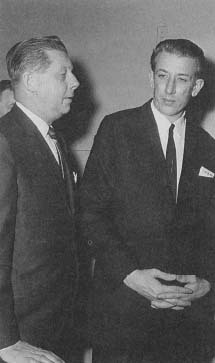Richard Franklin Speck Trial: 1967
Trial Moved
Because of the intense local media coverage, Richard Speck's chief attorney, Gerald Getty, requested a change of trial venue. When the trial opened in the morning of February 20, 1967, it was in Peoria, Illinois, some 140 miles from Chicago. Getty also won another important victory by having all eight murder charges consolidated into one trial with one verdict and one sentence. Assistant State Attorney William Martin had wanted the cases tried individually. That way, even if Speck was acquitted on one count, there were still seven others to trap him. Despite this setback, Martin remained confident that the state had sufficient evidence for conviction.
For two days he carefully laid the groundwork of his case. His first witnesses, sailors Dante Bargellini and George Mackey, both placed Speck in the vicinity of the nurses' house just before the murder and also confirmed his expressed desire to return to New Orleans. Other witnesses testified to seeing Speck on a day-long drinking binge, brandishing a gun and a knife.
It wasn't until the third day of testimony that Martin produced the prosecution's prime witness: Corazon Amurao. She described being awakened by four knocks at her bedroom door. "I went to the door, … I unlocked it, … then I saw a man … with a gun in his right hand pointed towards me and I noticed that he had marks on his face … and his hair was blond."
The atmosphere was electric as Martin asked, "Now, Miss Amurao, if you see that same man in the courtroom today,… would you please step down and point him out." Amurao didn't hesitate. She crossed to the defense table, raised her hand and pointed directly at Speck. "This is the man."
Next, Amurao told how Speck herded all six girls present in the townhouse into the bedroom, then tore strips off a sheet and tied them up. Later, when three other nurses returned home, they too were made captive. She described Speck's peculiar ambivalence towards his prisoners, smiling a lot, almost friendly. "Don't be afraid," he said while tying one of the girls, "I'm not going to kill you."
Minutes later he began doing just that.
Using a scale model of the townhouse and eight wooden blocks to represent the murder victims, Martin asked Corazon Amurao to describe the events. Richard Speck, she said, went across to Patricia Wilkening, untied her ankles, and led her from the room.
"After Speck had taken Wilkening from the south bedroom, did you hear anything?" asked Martin.
"After about one minute I heard Miss Wilkening say 'Ah.' It was like a sigh."
"Did you hear anything after the noise you just described?"
"No."
But after the next two victims were removed from the bedroom, Amurao did hear something: "water running in the bathroom, as if Speck was washing his hands."
The macabre process continued. Speck would enter the bedroom, lead one of the girls away with him, then return several minutes later for his next victim. When the girls tried to hide, Speck found them all—except Corazon Amurao. Eventually, only she and Gloria Davy were left.
Frozen with fear in her hiding place beneath the bed, Amurao could only watch in horror as Speck stripped Gloria Davy and raped her. It later transpired that Davy, the only victim of sexual assault, was very similar to Speck's estranged wife, whom he hated and had threatened on several occasions to kill.
"Was your head down at that time?"
asked Martin.
"Yes."
"When did you next look up?"
"About five minutes after the bedsprings stopped. I looked up and saw that Davy and Speck was [sic] not there anymore."
 Richard Speck (right), with his lawyer, public defender Gerald Getty.
Richard Speck (right), with his lawyer, public defender Gerald Getty.
Amurao's account of her five-hour ordeal, made all the more poignant by her faltering English, was devastating. When Public Defender Gerald Getty rose to cross-examine, he faced the toughest task of his career. Not once had he lost a client to the electric chair; no one present in court expected that record to survive.
Additional topics
Law Library - American Law and Legal InformationNotable Trials and Court Cases - 1963 to 1972Richard Franklin Speck Trial: 1967 - Trial Moved, Mistaken Identity?